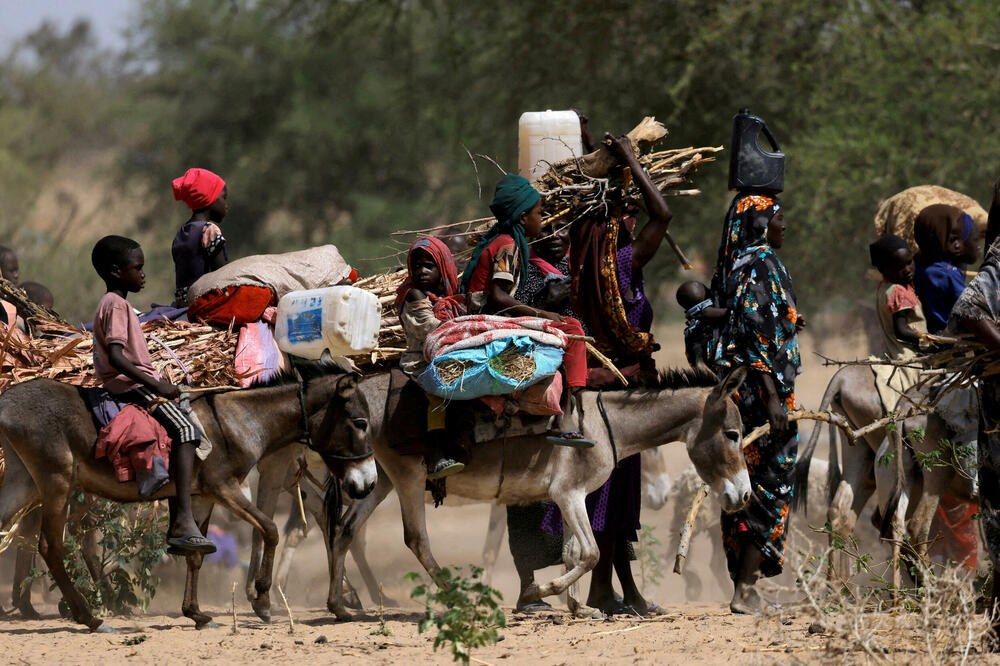The latest satellite images indicate that the Sudanese paramilitary Rapid Support Force (RSF) and other militant groups have attacked and burned villages in war-torn Darfur (a region in Sudan) in recent days, raising fears of more mass killings in the region, world media write.
Reports also indicate that there are signs that the current war, now entering its second year, could claim more lives than the violence of two decades ago as the RSF is now better armed with the help of countries such as the United Arab Emirates, Iran and Egypt.
Risk of new crimes
The rise in violence around Al Fashir, the capital of North Darfur, has prompted warnings from US officials, the United Nations (UN) and analysts who monitor the fighting about the risk of new crimes against black communities in the region, the Wall Street Journal wrote.
The predominantly ethnic Arab RSF and local militant groups have already killed thousands of people since the war for control of Sudan broke out a year ago between the paramilitary group and the country's army, the newspaper said.
Last year's battle for the West Darfur town of El Geneina claimed the lives of around 15.000 people, UN investigators said in a recent report, adding that as many as 2.000 people were killed in a massacre at the displaced camp in November.
According to the New York paper, the RSF has allied itself with Arab leaders in Darfur, whose traditionally nomadic herding communities have long competed with black farming communities for land in the mineral-rich region, in its war against the Sudanese army.
The RSF and other militant groups have used the war to expand their rule over Darfur, often targeting people already displaced by violence in the early 2000s.
The violence in and around Al Fashir was the topic of a UN Security Council meeting on April 19, when UN officials said about 36.000 people had fled to Al Fashir from surrounding villages in recent days.
Experts monitoring the violence in Darfur and Sudanese activists say the RSF's prolonged siege of Al Fashir — the only regional capital in Darfur still held by the Sudanese army — could cost many more lives.
UN agencies also warn that hundreds of thousands of Darfur residents are suffering from starvation after more than a year of war during which both the RSF and the Sudanese army have stopped humanitarian aid from reaching the population.
Mutasim Ali, a Sudanese human rights activist who has spent decades researching the conflict in Darfur, said there are signs that the current war may claim more lives than the violence of 20 years ago because the RSF is now better armed.
The Journal also recalls that in August it reported that the United Arab Emirates had supplied the RSF with a large amount of weapons, while the Sudanese army had meanwhile bought drones from Iran and other support from Egypt.
Intensification of conflict
Satellite data revealed that the number of Sudanese settlements set on fire in March rose to 30, the highest monthly total recorded since fighting broke out between the country's army and the paramilitary Rapid Support Force (RSF) last April, the Guardian wrote.
The paper points to analysis by the London-based Center for Information Resilience (CIR) which confirms growing concerns that Sudan's civil war is steadily intensifying, with 22 villages destroyed or damaged by fire in February and 10 destroyed in January and December.
Anouk Teunisen, head of CIR's Sudan team of investigators, said the data showed a "worrying development" in the brutal war between two rival military factions in Sudan.
Most of the recently damaged villages were in Darfur, a vast region in western Sudan, where 17 villages were targeted last month. Among them was Al Fashir, the capital of North Darfur and the scene of escalating fighting as the RSF tries to capture the city.
Reports in mid-April also indicated that 40.000 people in Al Fashir had fled their homes after the RSF and allied militant groups stormed villages on the western outskirts of the city, killing at least 11 Jews, the paper said, noting that the RSF was accused of ethnic cleansing as well as rape and looting, in a rampage against ethnic Masalites across Darfur.
Hundreds of thousands of displaced people have sought refuge around Al Fashir, which is why UN Secretary General Antonio Guterres recently warned of serious humanitarian consequences if the situation worsens further.
The fires are just one aspect of a grueling war that has forced more than eight million people from their homes - the biggest global displacement crisis - and millions more on the brink of starvation.
In an effort to address the country's desperate lack of humanitarian aid, international donors pledged more than two billion euros at a conference in Paris in mid-April. On that occasion, the German Minister of Foreign Affairs, Analena Berbok, warned that a million people could die of hunger in Sudan this year.
The problem of foreign interference
UN officials warn that the war in Sudan has caused a "crisis of epic proportions" fueled by weapons from "foreign supporters" who continue to defy UN sanctions aimed at helping end the conflict, the Associated Press reports.
Sudan descended into chaos in mid-April 2023, when tensions between its army, led by General Abdel Fattah Burhan, and the RSF paramilitary unit commanded by Mohamed Hamdan Dagalo escalated into street battles in the capital, Khartoum, the AP recalls, adding that fighting spread to other parts of the country, especially urban areas and the western region of Darfur. Mohamed Ibn Chambas, chairman of the African Union panel on Sudan and high representative for the "Silence the Guns in Africa" initiative, called external interference "a major factor complicating efforts to negotiate a ceasefire and stop the war."
Ali Burhan, who led the military takeover of Sudan in 2021, is a close ally of neighboring Egypt and its president, former army chief Abdel-Fattah el-Sisi.
In February, Sudan's foreign minister held talks in Tehran with his Iranian counterpart amid unconfirmed reports of drone purchases for government forces.
The leader of the Rapid Support Force, Dagalo, reportedly also received support from the Russian mercenary group Wagner, AP noted, pointing to a recent UN report that said the RSF also received support from Arab allied communities and new military supply routes that pass through through Chad, Libya and South Sudan.
Two decades ago, Darfur was synonymous with genocide and war crimes, particularly by the notorious Janjaweed Arab militias, against populations identifying as Central African or East African. That legacy seems to have returned, AP said, adding that the prosecutor of the International Criminal Court, Karim Khan, said in late January that there are reasons to believe that both sides may be committing war crimes, crimes against humanity or genocide in Darfur.
Devastation of Sudan
The forces of two rival generals have been ravaging Sudan, Africa's third-largest country, for a year, triggering a wave of violence that has driven 8,6 million people from their homes, the New York Times reported.
Sudan occupies a key position on the African continent. It has a significant coastline on the Red Sea, one of the busiest sea routes in the world. It shares borders with seven countries - the Central African Republic, Chad, Egypt, Eritrea, Ethiopia, Libya and South Sudan - many of which are also threatened by instability.
Sudan's year-long war has already destroyed the capital Khartoum, once a major center of trade and culture on the Nile, the paper said, citing claims by residents and aid workers who say abandoned neighborhoods are now full of bullet-scarred buildings and bodies buried in shallow graves.
The UN has warned that more than a third of Sudan's 48 million people face catastrophic levels of hunger, with nearly 230.000 severely malnourished children and new mothers facing death in the coming months if they do not receive food and health care.
Dozens of hospitals and clinics have closed, aid workers say, while the closure of schools and universities in the country, which has historically attracted many foreign students, has precipitated what the UN says is "the world's worst education crisis".
Civilians have been killed, humanitarian camps and homes have been burned, and refugees who fled the previous violence are crossing the border with Chad, vowing never to return home, the newspaper writes, pointing to UN data that of the millions displaced by the conflict, more than 6,6 million remained inside Sudan.
Nearly 1,8 million others have fled to neighboring countries, including South Sudan, Chad, Egypt, Ethiopia and the Central African Republic.
Multiple attempts to achieve a cease-fire have not been successful, the New York Times emphasized, adding that UN calls for a temporary cessation of hostilities were largely ignored.
Bonus video:





